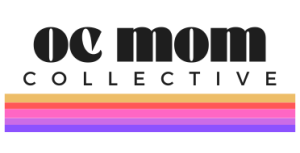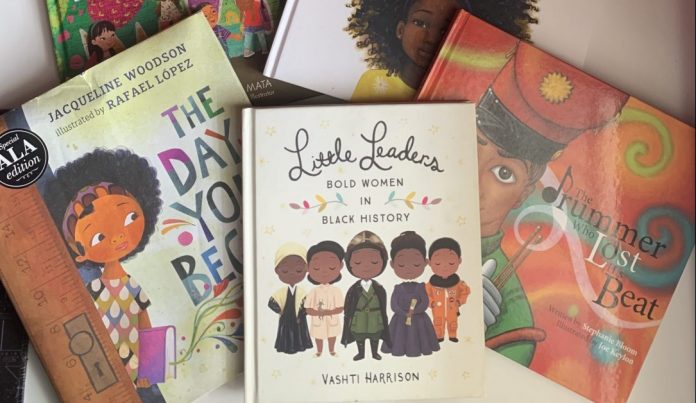I’m a big proponent of #RaiseAReader and I also want my interracial kids to understand all of our collective history and culture. In honor of Martin Luther King Jr. Day this month and Black History Month coming up in February, I looked through my daughter’s collection of picture books for some great stories to help kids and parents alike understand more about the important history of Black Americans in this country, and our continued cultural contributions.
Here are our favorite Black History Month Books for children and families!
“I Am Enough” by Grace Byers
A fellow Alumnus of University of California, Irvine, Byers (who many may know from her role of Anika on Empire) writes a love letter to the reader promoting self-love and acceptance. It’s beautifully written and illustrated and something that we all likely could be repeating to ourselves throughout the day. The cover alone, with a Black girl with natural hair and dark skin, promotes a more diverse and inclusive standard of beauty thus we regularly display on the floating shelves in our daughter’s room.
“Little Leaders: Bold Women in Black History” by Vashti Harrison
This book alone is a must-have in my opinion and it’s also part one of three-part series. We are looking forward to adding the two additional titles to our library. Harrison provides short stories on well-known names like poet and activist Maya Angelou but also lesser-known Black heroines like pilot Bessie Coleman. It’s a good one to read in order or sprinkle the stories throughout for some serious admiration and inspiration.
“The Day You Begin” by Jaqueline Woodson
I met this author at an American Library Association conference in New Orleans shortly after my daughter was born. I felt and still feel a close connection to Woodson’s honest look at how being different in our society can be discouraging, intimidating, and downright terrifying at times. It’s a reminder of how far we have come, but also about the inherent struggle people who are not part of any majority may feel. As such, it’s subsequently a story of it being okay being the only, and how to use that to shape yourself and your experiences.
“I Promise” by Lebron James
My husband recently went to a book store with the kids and picked up this title by the famous basketball player. James uses the importance of personal action and responsibility paired with family and community needs to model a way of life for the reader that in my opinion is highly based on generations of Black history dedication to lifting the entire community up socially, economically, and politically. It’s a way of life that many marginalized communities have had to adopt in order to combat systematic barriers to the pursuit of life, liberty and happiness.
The Drummer Who Lost His Beat” by Stephanie Bloom
I love this book in its representation of music that is so central to understanding the human experience and something that filled the rooms of my household growing up with a father who is an audiophile. Bloom takes the reader through the journey of a musician struggling artistically but also the important genres of music like Jazz and Blues that continue to shape and illustrate Black history and culture in the United States.
Make sure and check out some of our favorite books for adults too
Go Tell It on The Mountain by James Baldwin
“Baldwin’s classic novel opened new possibilities in the American language and in the way Americans understand themselves. With lyrical precision, psychological directness, resonating symbolic power, and a rage that is at once unrelenting and compassionate, Baldwin tells the story of the stepson of the minister of a storefront Pentecostal church in Harlem one Saturday in March of 1935. Originally published in 1953, Baldwin said of his first novel, “Mountain is the book I had to write if I was ever going to write anything else.””
Caste: The Origins of Our Discontents by Isabel Wilkerson
“As we go about our daily lives, caste is the wordless usher in a darkened theater, flashlight cast down in the aisles, guiding us to our assigned seats for a performance. The hierarchy of caste is not about feelings or morality. It is about power–which groups have it and which do not.”
Me and White Supremacy by Layla Saad
“Based on the viral Instagram challenge that captivated participants worldwide, Me and White Supremacy takes readers on a 28-day journey, complete with journal prompts, to do the necessary and vital work that can ultimately lead to improving race relations.
Updated and expanded from the original workbook (downloaded by nearly 100,000 people), this critical text helps you take the work deeper by adding more historical and cultural contexts, sharing moving stories and anecdotes, and including expanded definitions, examples, and further resources, giving you the language to understand racism, and to dismantle your own biases, whether you are using the book on your own, with a book club, or looking to start family activism in your own home.”
We Want Our Bodies Back by Jessica Care Moore
“Over the past two decades, jessica Care moore has become a cultural force as a poet, performer, publisher, activist, and critic. Reflecting her transcendent electric voice, this searing poetry collection is filled with moving, original stanzas that speak to both Black women’s creative and intellectual power, and express the pain, sadness, and anger of those who suffer constant scrutiny because of their gender and race. Fierce and passionate, Jessica Care moore argues that Black women spend their lives building a physical and emotional shelter to protect themselves from misogyny, criminalization, hatred, stereotypes, sexual assault, objectification, patriarchy, and death threats.
We Want Our Bodies Back is an exploration–and defiant stance against–these many attacks.”
I’m Still Here by Austin Channing Brown
“Austin Channing Brown’s first encounter with a racialized America came at age seven, when she discovered her parents named her Austin to deceive future employers into thinking she was a white man. Growing up in majority-white schools and churches, Austin writes, “I had to learn what it means to love blackness,” a journey that led to a lifetime spent navigating America’s racial divide as a writer, speaker, and expert helping organizations practice genuine inclusion.”
All The Black Girls Are Activists by Ebonyjanice Moore
“All The Black Girls Are Activists is a love letter to Black girls and Black women, asking and attempting to offer some answers to “Who would black women get to be if we did not have to create from a place of resistance?” by naming Black women’s wellness, wholeness, and survival as the radical revolution we have been waiting for.”
Sister Outsider by Audre Lorde
“In this charged collection of fifteen essays and speeches, Lorde takes on sexism, racism, ageism, homophobia, and class, and propounds social difference as a vehicle for action and change. Her prose is incisive, unflinching, and lyrical, reflecting struggle but ultimately offering messages of hope. This commemorative edition includes a new foreword by Lorde-scholar and poet Cheryl Clarke, who celebrates the ways in which Lorde’s philosophies resonate more than twenty years after they were first published.
These landmark writings are, in Lorde’s own words, a call to “never close our eyes to the terror, to the chaos which is Black which is creative which is female which is dark which is rejected which is messy which is . . . “
“First published in 1941, Deep South is a landmark work of anthropology, documenting in startling and nuanced detail the everyday realities of American racism. Living undercover in Depression-era Mississippi—not revealing their scholarly project or even their association with one another—groundbreaking Black scholar Allison Davis and his White co-authors, Burleigh and Mary Gardner, delivered an unprecedented examination of how race shaped nearly every aspect of twentieth-century life in the United States. Their analysis notably revealed the importance of caste and class to Black and White worldviews, and they anatomized the many ways those views are constructed, solidified, and reinforced.”
“For years, Cole Arthur Riley was desperate for a spirituality she could trust. Amid ongoing national racial violence, the isolation of the pandemic, and a surge of anti-Black rhetoric in many Christian spaces, she began dreaming of a more human, more liberating expression of faith. She went on to create Black Liturgies, a digital project that connects spiritual practice with Black emotion, Black memory, and the Black body.”
“In A Renaissance of Our Own, we witness the sometimes painful but always inspiring breaking points in Cargle’s life that fostered a truer identity. These defining moments offer a blueprint for how we must all use our imagination—the space that sees beyond limits—to live in alignment with our highest values and to craft a world independent of oppressive structures, both personal and societal. Cargle now invites you to acknowledge ways of being that stem from societal expectations instead of your personal truth, and to embark on a renaissance of your own. She provides the very tools and prompts that she used to unearth her own truth, tools that opened her up to being a more authentic feminist and purpose-driven matriarchal leader.”
What books would you add the the list?












